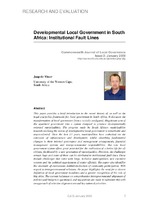Developmental local government in South Africa: institutional fault lines
Abstract
This paper provides a brief introduction to the recent history of, as well as the
legal and policy framework for, local government in South Africa. It discusses the
transformation of local government from a racially configured, illegitimate arm of
the apartheid government into a system designed to produce developmentally
oriented municipalities. The progress made by South African municipalities
towards realising the vision of developmental local government is remarkable and
unprecedented. Over the last 13 years, municipalities have embarked on the
extension of infrastructure and development, whilst absorbing fundamental
changes to their internal governance and management arrangements, financial
management systems and intergovernmental responsibilities. The new local
government system offers great potential for the realisation of a better life for all
citizens, facilitated by a new generation of municipalities. However, the challenges
remain huge and some of these can be attributed to institutional fault lines. These
include challenges that come with large, inclusive municipalities, new executive
systems and the political appointment of senior officials. The paper also identifies
the downside of overzealous institutionalisation of community participation. With
regard to intergovernmental relations, the paper highlights the need for a clearer
definition of local government mandates and a greater recognition of the role of
big cities. The current insistence on comprehensive intergovernmental alignment of
policies and budgets is questioned, and suggestions are made to substitute this with
an approach of selective alignment around key national priorities.

